|
|
|
Sort Order |
|
|
|
Items / Page
|
|
|
|
|
|
|
| Srl | Item |
| 1 |
ID:
172089
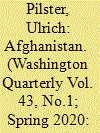

|
|
|
| 2 |
ID:
163112
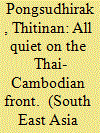

|
|
|
|
|
| Summary/Abstract |
That Thai-Cambodian relations are stable and peaceful after Thailand’s most recent military coup in 2014 is counterintuitive and inconsistent with recent trends and dynamics. When governments loyal to Thaksin Shinawatra took power over the past decade, bilateral relations were cordial and constructive. Conversely, when anti-Thaksin governments were in office, Thai-Cambodian relations became unstable and adversarial. But this has not been the case after the military regime under General Prayut Chan-ocha seized power and overthrew the Thaksin-aligned government of Prime Minister Yingluck Shinawatra. The dominant strand of scholarly explanations attributes the volatile bilateral relationship to Thai historical forces interacting with domestic politics, underpinned by a ‘national humiliation’ discourse dating to French imperialism. But such an informed understanding is unable to pinpoint the timing and extent of the bilateral conflict when it flared up. Synthesising overlapping streams of literature and drawing on select interviews, this article sets out to demonstrate that the post-coup Thai government’s commitment and resolve to prevail at all costs ahead of the royal succession and the incumbent Cambodian government’s weakened political legitimacy at home have combined to situate and normalise bilateral relations on a new plateau.
|
|
|
|
|
|
|
|
|
|
|
|
|
|
|
|
| 3 |
ID:
113277
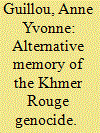

|
|
|
|
|
| Publication |
2012.
|
| Summary/Abstract |
This article contrasts the ways in which the memories of the Khmer Rouge genocide have been constructed at different levels and at different periods since the 1980s. Various actors have been involved in this construction, such as the ruling Cambodian People's Party, the Khmer Rouge Court sponsored by the United Nations since 2007, and Cambodian villagers. This has led to numerous misunderstandings and discrepancies regarding the trial of the former Khmer Rouge leaders. The current research is based on ethnographic fieldwork undertaken in a village in the province of Pursat. It shows how the villagers have taken care of the human remains from the state-sponsored memorials and of the mass graves (that is to say, of the unknown bodies). The article shows how the Khmer popular religious system is instrumental in forging a memory of the dead of the Pol Pot regime and in healing social suffering.
|
|
|
|
|
|
|
|
|
|
|
|
|
|
|
|
| 4 |
ID:
099937
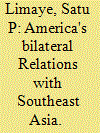

|
|
|
|
|
| Publication |
2010.
|
| Summary/Abstract |
This special issue of Contemporary Southeast Asia examining United States bilateral relations with Myanmar, Cambodia, Indonesia, Laos and Vietnam, and specifically the mutual efforts at "rapprochement", "re-engagement" or "revitalization", is informed by several considerations. First, the Obama administration took office with a declared commitment to improve relations with the Association of Southeast Asian Nations (ASEAN) as an organization and moved with alacrity to implement a number of policy decisions to that end. Second, and in parallel, the administration highlighted opportunities for broader and deeper bilateral relations with specific ASEAN member countries…Together, this focus on Southeast Asia is an important element of the current administration's overall focus on US relations with the Asia Pacific - a focus which represents one of the most significant periods of US regional activism in decades.
|
|
|
|
|
|
|
|
|
|
|
|
|
|
|
|
| 5 |
ID:
069036
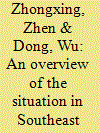

|
|
|
| 6 |
ID:
124716
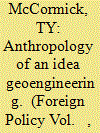

|
|
|
|
|
| Publication |
2013.
|
| Summary/Abstract |
The article provides various historical anecdotes regarding efforts to engineer weather and climate. It includes the 1841 theories of American meteorologist James Pollard Espy to promote rain by igniting massive fires, the 1896 findings by Swedish chemist Svante Arrhenius that found a direct correlation between a rise in carbon dioxide levels and rising temperatures across the globe, and the 1967-1972 Operation Popeye which used cloud seeding as a U.S. military tactic during the Vietnam War and its associated military operations in Cambodia and Laos.
|
|
|
|
|
|
|
|
|
|
|
|
|
|
|
|
| 7 |
ID:
098380
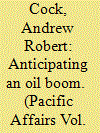

|
|
|
|
|
| Publication |
2010.
|
| Summary/Abstract |
By mid-decade, Cambodia will likely begin production of offshore oil fields containing an estimated 700 million to two billion barrels of oil and significant quantities of natural gas. This long anticipated event has prompted considerable discussion of whether petroleum-derived wealth will be a blessing or a curse. Much of the discussion has been framed through the lens of the "resource curse" thesis. The purpose of this article is to consider how the notion of a resource curse has entered the Cambodian political arena and to examine the questions it has prompted Cambodia's ruling elite and external actors to ask concerning the management of petroleum resources. Based on a systematic examination of the evolution of government policy, and of external attempts to shape its development, I show how warnings of a "resource curse" have come to be deployed in different ways by reform promoting aid donors, civil society groups, and the ruling elite. The article concludes by noting that while these warnings have helped to highlight risks associated with the rapid exploitation of petroleum resources, little will or capacity exists either domestically or internationally to transcend technical fixes to the pathologies of petroleum revenue wealth and to press for a more transparent exploitation regime.
|
|
|
|
|
|
|
|
|
|
|
|
|
|
|
|
| 8 |
ID:
175475
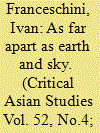

|
|
|
|
|
| Summary/Abstract |
Although much has been written about China’s Belt and Road Initiative (BRI), so far little attention has been paid to how Chinese investment is affecting workers in BRI-targeted countries. To explore this dimension of global China, this paper examines the labor rights situation at Chinese-owned construction sites in Sihanoukville, a city on the Cambodian coast that in recent years has been described as embodying the worst excesses of Chinese foreign investment. Based on extensive interviews with Chinese and Cambodian workers, this paper argues that while Chinese-owned construction sites in Cambodia are grounded in a labor regime as exploitative as those in mainland China, workers’ agency in the former case is further undermined by their employers’ adoption of a policy of labor force dualism that draws boundaries between Chinese and Cambodian workers.
|
|
|
|
|
|
|
|
|
|
|
|
|
|
|
|
| 9 |
ID:
080573
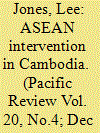

|
|
|
|
|
| Publication |
2007.
|
| Summary/Abstract |
Despite their other theoretical differences, virtually all scholars of the Association of Southeast Asian Nations (ASEAN) agree that the organization's members share an almost religious commitment to the norm of non-intervention. This article disrupts this consensus, arguing that ASEAN repeatedly intervened in Cambodia's internal political conflicts from 1979 to 1999, often with powerful and destructive effects. ASEAN's role in maintaining Khmer Rouge occupancy of Cambodia's UN seat, constructing a new coalition government in exile, manipulating Khmer refugee camps and informing the content of the Cambodian peace process will be explored, before turning to the 'creeping conditionality' for ASEAN membership imposed after the 1997 'coup' in Phnom Penh. The article argues for an analysis recognizing the political nature of intervention, and seeks to explain both the creation of non-intervention norms and specific violations of them as attempts by ASEAN elites to maintain their own illiberal, capitalist regimes against domestic and international political threats.
|
|
|
|
|
|
|
|
|
|
|
|
|
|
|
|
| 10 |
ID:
179629


|
|
|
|
|
| Summary/Abstract |
World trade has been the engine of global growth and demand for free and fair global trade free from protectionist measures is still the most accepted desirable norms. We are living in a multipolar global economic order today where global economic major powers have started accepting the role and potential of regional manufacturing hubs. America , China , Italy , Germany , united kingdom , Russia have been governing the global economy for a long time and even maintained their hegemony in global supply chain. But now the multiple trade wars among several global powers have given opportunities to regional manufacturing hubs across the globe to flourish.
|
|
|
|
|
|
|
|
|
|
|
|
|
|
|
|
| 11 |
ID:
137896
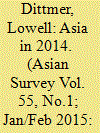

|
|
|
|
|
| Summary/Abstract |
THOUGH SOME MAY HAVE APPROACHED the centenary of the outbreak of World War One with a certain superstitious foreboding, 2014 in Asia was a pretty good year. As Xi Jinping put it in his May 21 address to the CICA (Conference on Interaction and Confidence Building Measures in Asia), ‘‘Asia today, though facing more risks and challenges, is still the most dynamic and promising region in the world.’’1 Economically, Asia remains the fastest growing region, averaging an estimated 6.1% GDP growth for the year, and the forecasting consensus predicts an even better next year. This is an impressive performance in the wake of the global 2009–13 slowdown and particularly the recent cooling of the Chinese locomotive. Politically, the headline for the year is democratic resilience, with relatively honest elections in Afghanistan, India, Bangladesh, Indonesia, and (jumping a few days into 2015) Sri Lanka. As for international security, on the other hand, it was a year of rising tensions: violent terrorist attacks in Afghanistan, Pakistan, Burma/Myanmar, India’s Assam, China’s Xinjiang; continuing confrontations over maritime boundaries in the South and East China Seas; and renewed fighting between India and Pakistan over Kashmir.
|
|
|
|
|
|
|
|
|
|
|
|
|
|
|
|
| 12 |
ID:
053177
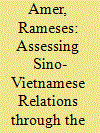

|
|
|
| 13 |
ID:
052239
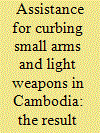

|
|
|
| 14 |
ID:
097412
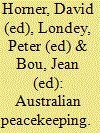

|
|
|
|
|
| Publication |
Cambridge, Cambridge University Press, 2009.
|
| Description |
xviii, 333p.
|
| Standard Number |
9780521735926
|
|
|
|
|
|
|
|
|
|
|
|
Copies: C:1/I:0,R:0,Q:0
Circulation
| Accession# | Call# | Current Location | Status | Policy | Location |
| 055046 | 355.3570994/HOR 055046 | Main | On Shelf | General | |
|
|
|
|
| 15 |
ID:
130056
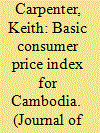

|
|
|
|
|
| Publication |
2014.
|
| Summary/Abstract |
This paper calculates a National Basic Consumer Price Index for Cambodia for 1993-2009 using data gathered in twelve provincial urban and rural markets and Phnom Penh, by the Cambodia Development Resource Institute (CDRI) and the Cambodian National Institute of Statistics (NIS), respectively. The data collected by the CDRI were used to calculate a Provincial Basic Consumer Price Index for Cambodia for 1993-2009. Data from the NIS Consumer Price Index for Phnom Penh were used to calculate a Basic Consumer Price Index for Phnom Penh for the same period. This latter index was combined with the Provincial Basic Consumer Price Index, using appropriate population weights, to calculate a National Basic Consumer Price Index for Cambodia. This is a measure of prices paid by the poor for basic consumer items. The paper concludes with a discussion of price movements for basic consumer goods over the period 1993-2009, along with a comment on policy implications arising from the study.
|
|
|
|
|
|
|
|
|
|
|
|
|
|
|
|
| 16 |
ID:
102006
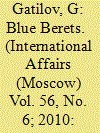

|
|
|
|
|
| Publication |
2010.
|
| Summary/Abstract |
THE UN'S BLUE BERETS have become a permanent feature of world politics in the past few decades. No matter where interstate or internal conflicts flare up in the world, the UN duly sends international military contingents and observers, as well as police officers and civilian personnel, to these hot spots to halt the hostilities and restore stability. This activity has essentially been the visible embodiment of the UN's global role, its business card, for more than 60 years now.
|
|
|
|
|
|
|
|
|
|
|
|
|
|
|
|
| 17 |
ID:
068850
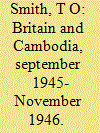

|
|
|
| 18 |
ID:
113276
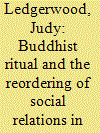

|
|
|
|
|
| Publication |
2012.
|
| Summary/Abstract |
This paper examines the resilience of local Cambodian kinship and village communities in the aftermath of devastating violence. These communities are explored as cross-cutting sets of exchange relationships between local community residents, community members and their urban relatives, lay people and Buddhist monks, and the living and the dead - in the context of the annual phchum ben ceremony, or 'festival of the dead'. The phchum ben ceremony is an act of 'social resilience' in the spirit of this special issue; the ritual is an act of mourning, a demonstrative activity expressing grief, and a process to restore the disrupted social relations between the living and the deceased ancestors, especially those who died during war and the reign of the Khmer Rouge in the state known formally as Democratic Kampuchea (1975-79). The ritual focuses on community cohesion, as most rituals do, and social networks are enacted, recreated and displayed; by participating, people declare their membership of various social groups. The paper emphasizes that, in the contemporary economic and social context, the ritual is also about enacting and proclaiming social hierarchy, highlighting the gap between wealthy and powerful (now often urban) family members and their poor and dependent rural cousins.
|
|
|
|
|
|
|
|
|
|
|
|
|
|
|
|
| 19 |
ID:
174736
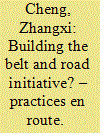

|
|
|
|
|
| Summary/Abstract |
This study attempts to understand the pragmatic development of the belt and road initiative (BRI) in light of the Chinese government’s stated claim that the BRI will be ‘using key economic industrial parks as cooperation platforms’. Through the examination of three overseas economic and trade cooperation zones in the context of the BRI, this study engages with current Chinese language work on the BRI to argue that whilst at the regional level some initiatives may be workable and able to deliver given certain circumstances, in consideration of the goal of continuous expansion of the BRI, both the Chinese government’s role and corporate awareness by Chinese investors is lacking and has undermined general policy goals.
|
|
|
|
|
|
|
|
|
|
|
|
|
|
|
|
| 20 |
ID:
132801


|
|
|
|
|
| Publication |
2014.
|
| Summary/Abstract |
Burma was inhabited by migration of Mongol people from China thousands of years ago as part of a migration that also settled Mongol people in Assam, the hills and valleys of Northeast India, Bhutan, Sikkim, Nepal, and Tibet. Another wave migrated and populated South East Asia-Malaya, Vietnam, Laos, Cambodia, Indonesia and the Philippines. In Burma, a majority settled in the Central plains, while others 'settled on the hill ranges that extended north-south on either side of the Central plains. All these different groups had evolved animist religions. In India to the West, two major religions evolved, besides numerous animist religions too. The two major religions were Hinduism and Buddhism. It was the Buddhist king Ashoka who propagated Buddhism to several countries to the West and East of his country. To the East, the emissaries of Ashoka carried Buddhism to Burma and several South East Asian countries, Vietnam, Cambodia, Laos, Sri Lanka, Tibet, China and Japan.
|
|
|
|
|
|
|
|
|
|
|
|
|
|
|
|
|
|
|
|
|